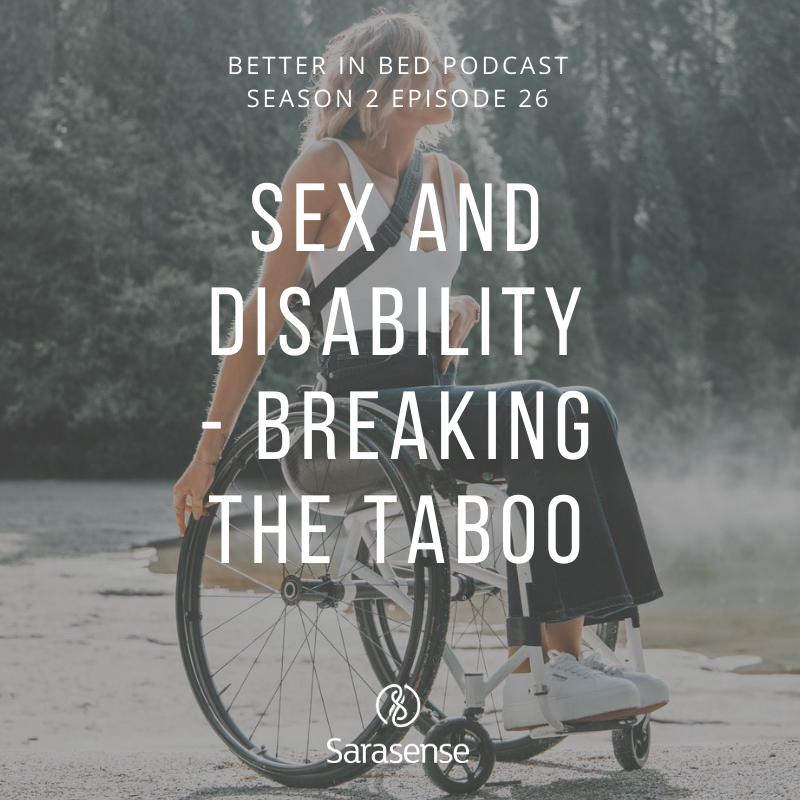26. SEX AND DISABILITY – BREAKING THE TABOO
LISTEN NOW!
DO PEOPLE WITH DISABILITIES HAVE A RIGHT TO BE SEXUAL? AND WHAT CAN THEY TEACH ABLE-BODIED PEOPLE ABOUT INTIMACY AND SEXUALITY?
On this episode, Sara and co-host Kat talk to Carmen Yau, a registered social worker with a PhD from Hong Kong Polytechnic University and founder of erotica collection, “Sugar’s XXX Stories”.
Having been born with spinal muscular atrophy, Carmen is an iconic spokesperson for the sexual equality of people with disabilities and women. She is very vocal about breaking the taboo of people with disabilities often being considered asexual, as well as debunking other myths.
Armed with her own personal experiences living in a traditional Asian culture which focuses on “infantilising” people with disabilities as a form of protection, she shares how she was able to explore her sexuality, in spite of her physical limitations.
In particular, she talks about the creativity that people with disabilities use in terms of coming up with unique sex toys, sex positions, and even how their bodies can sometimes develop heightened senses that can lead to “abstract orgasms”
This episode will challenge your idea of what is considered “normal” in sex and sexuality. Listen in as Carmen shares an empowering message for everyone, whether disabled or able-bodied -about loving one’s body and valuing oneself. She believes that how you perceive yourself impacts how you conduct yourself with others, and how fruitful your life will be.
MORE JUICY BITS ON THE SHOW
1:58-8:17 Carmen Yau on “breaking the taboo” of sex for people with disabilities
10:12-19:17 How Carmen overcame her own challenges as a woman with disabilities
10:59-23:21 Finding role models and support groups online
25:04-26:34 The biggest myths around sex and disability
26:53-32:51 What’s an “abstract orgasm”?
33:41-38:34 Masturbation and sex toys for people with disabilities
51:22-52:32 How communication improves your sex life as a person with disabilities
52:46-57:38 Resources and sex positions to consider as a person with disabilities
57:50-58:40 What can people with disabilities teach able-bodied people about sex?
AUDIO GUIDE: WANT TO GET BETTER IN BED?
Download this FREE audio guide to get 3 critical strategies to help you creatively and confidently rock it between the sheets.
WORDS OF WISDOM
“I began to keep a sex diary around the time I studied narrative therapy, which is a tool or practice that encourages people to write their own stories. By writing your own stories and revealing your most personal experiences with sex, you can potentially help yourself break through self-imposed rules, schema, and limitations around sexuality.”
“The reason I’m advocating for masturbation and sex toys for people with disabilities is that we need to help people become familiar with their bodies and not have to always depend on someone else to give them orgasms. Research shows that if you have a good habit of masturbation, your mental and physical health is better, and you’re also much more sexually responsive.”
“People easily judge others if they are not similar to the norm. The only way to counter this is for people with disabilities to share their different experiences. Sex is culturally-constructed. Most people’s understanding of sex comes from porn; so we need more depiction of persons with disability to expand our appreciation of sexuality.”
“The most important thing we need to explore our sexuality with our partner is communication. This will allow us close gaps and find ways to navigate our challenges with sex as a person with disability. For example, males who are tetraplegic have sex positions that are hard to execute in missionary position; so they probably go for cowgirl or turn to one side of their body. So I think that, with communication, there are a lot of opportunities you can explore as a persons of disability.”
“The way I look at my disabled body as well as my gender and the way I explore how to live a more fruitful life… that is something really beneficial for everybody; not only people with disabilities, but also for women and people facing different sorts of challenges. It’s important that you look in the mirror and feel valued and loved, as well as how you can continue navigating that idea in your everyday life and engage in conversations with others about it.”
OTHER GREAT REFERENCES YOU'LL LOVE
Why I keep a sex diary (and you should too) — Carmen’s TED Talk on how she built a support group for people with disabilities looking to overcome challenges around sex
"How People with Disabilities Have Sex" — Various examples of how people with disabilities have sex in spite of their limitations
"The taboos around disability and sex put limits on everyone, disabled or not" — The title says it all: whether or not you’re a person with disability, this taboo doesn’t do any favors for anyone, and in fact preserves many highly-restrictive norms.
TELL US WHAT YOU THINK!
What are some other sex-related taboos that you think need to be broken? Leave us a comment below—we'd love to know!



